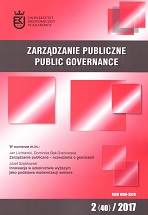Innovation in higher education as the basis for the modernization of the sector
DOI:
https://doi.org/10.15678/ZP.2017.40.2.02Keywords:
innovations, knowledge, economy, education quality, rankings, sectorAbstract
In higher education, innovations are all changes that can be positively evaluated from the point of view of one particular criterion: equalizing educational opportunities, the education system’s impact on innovations in the economy, improvement of graduates’ professional skills or their involvement in public life. As we will show in the article, the following can be considered as innovations: creation of non-public higher education establishments and vocational schools, changes in study programmes, improving teaching methods, implementing new methods of scientific research and so on. Higher education in Poland requires reconstruction. A considerable part of the sector remains non-privatized. The number of places available for students at state-owned universities today is 3.5 times bigger than before the transformation. Students of non-public universities, who pay tuition fees, are practically deprived of all state aid. Polish universities occupy low places in international rankings, and the innovativeness of the Polish economy is among the lowest in Europe and in the European Union. This innovativeness depends on many factors, but transfer of research results from the academe to the economy as well as preparing graduates for their professional careers are among the most important ones. The article is based on selected literature, analysis of statistical data, own research, and experience gathered e.g. while the author was the chairman of the Conference of Presidents of Non-public Universities in the years 2000-2005.



